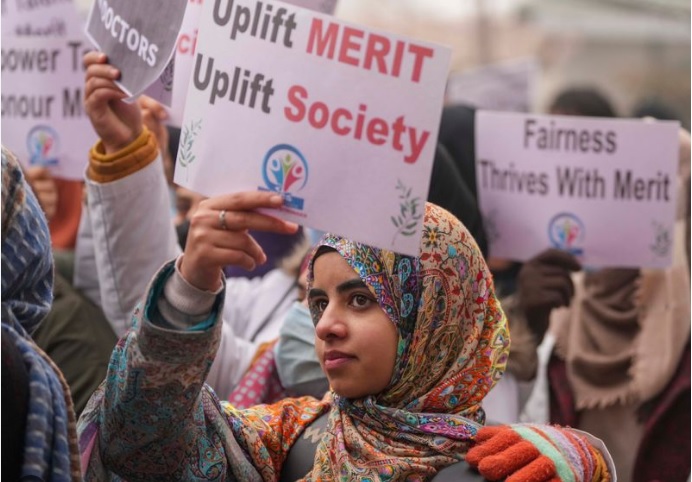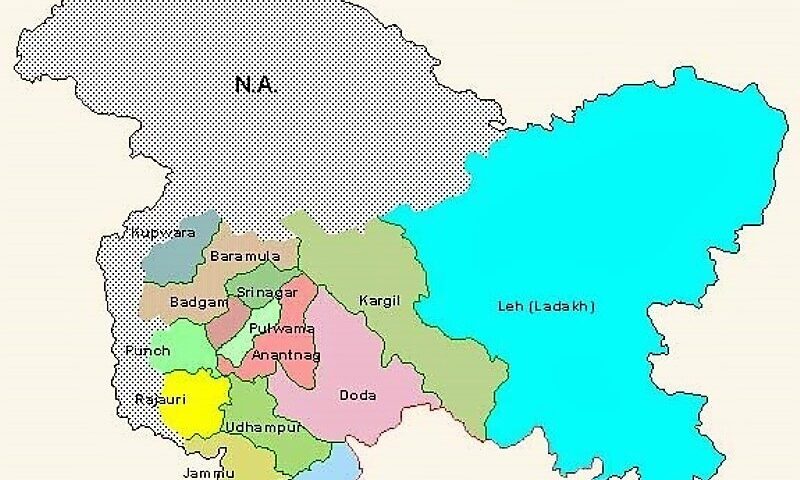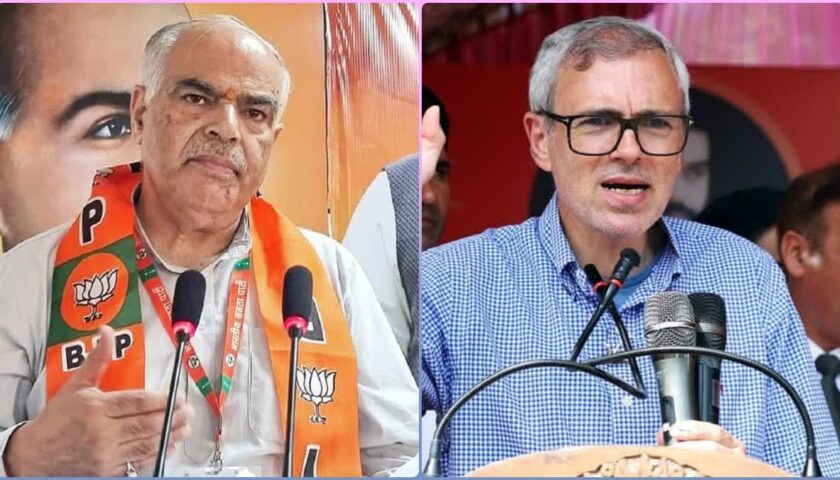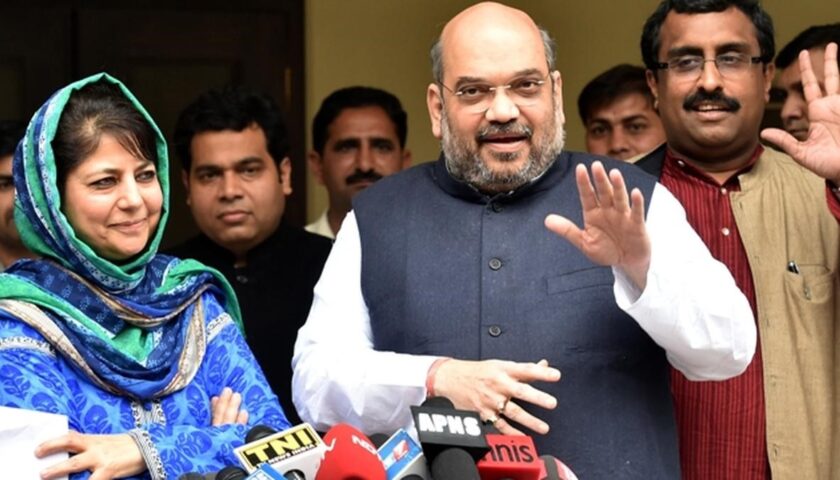Rising Student Dissent Over Delayed Reservation Reforms
By: Javid Amin | Srinagar | 21 June 2025
The long-standing debate over the reservation policy in Jammu & Kashmir has once again flared up—this time, with an emotional and strongly worded letter from open merit students addressed to Chief Minister Omar Abdullah. The students have accused the government of betraying their trust by failing to act on its own Cabinet Sub-Committee (CSC) recommendations on rationalizing reservations within the promised timeline.
In their open letter, the students expressed not just political discontent but emotional anguish, writing: “We feel betrayed—not just politically, but emotionally.” This growing frustration, now amplified across campuses and online platforms, signals deepening concerns about fairness, transparency, and equal opportunity within the state’s education and recruitment frameworks.
Background: What the CSC Report Promised
In December 2024, following sustained pressure from civil society groups, student unions, and political allies, the Jammu & Kashmir government established a Cabinet Sub-Committee (CSC) to study and recommend reforms to the region’s reservation system. The goal was to ensure a more equitable framework that balanced affirmative action with merit-based inclusion.
By February 2025, the CSC submitted its much-awaited report, calling for a rational review of existing reservation categories, the inclusion of economically weaker sections (EWS) within the general category, and a reassessment of “overlapping privileges” enjoyed by certain groups.
In a public address, CM Omar Abdullah committed to implementing the CSC recommendations “within six months”—a deadline that expired on June 10, 2025. Students and civil society advocates believed this marked a new era of inclusive policymaking.
Student Reaction: “Empty Promises and Political Apathy”
Instead of implementation, students were shocked to discover that the report had been quietly handed over to the Law Department for vetting—with no official statement, press briefing, or timeline for action.
In their letter to the CM, open merit students questioned the sudden procedural turn:
“Why wasn’t the legal vetting initiated immediately after the CSC submitted its report in February? Why the secrecy now?”
The letter, which has since gone viral on social media, alleges that transparency and accountability have been thrown aside, with the government appearing more interested in buying time than honoring commitments. Students also questioned whether the administration was “buckling under pressure” from powerful groups who benefit from the current reservation structure.
Emotional Toll and Sense of Exclusion
Beyond the policy itself, students stressed the emotional toll of feeling repeatedly marginalized. Many open merit candidates claim they have sacrificed years of effort, scoring high in competitive exams only to be sidelined due to rigid reservation quotas. The letter states:
“We feel invisible in a system that rewards identity over effort. Your promise was hope; now it feels like betrayal.”
The letter further noted that the silence from top government officials, despite repeated follow-ups and media queries, has “dehumanized and demoralized” a large section of aspirants who expected timely reform.
Government’s Defense: CM Omar Abdullah Breaks Silence
Facing mounting criticism, Chief Minister Omar Abdullah issued a formal statement clarifying the government’s position. He maintained that the Cabinet had indeed accepted the CSC report, but the nature of the recommendations required legal scrutiny before they could be implemented.
“This is a legal document. Due process must be followed before any actionable steps can be taken,” the CM said.
He went on to reject accusations of delay, calling them “politically motivated distractions” engineered by opposition parties seeking to create unrest. The CM reiterated that his administration remains committed to equitable reform but cannot bypass constitutional procedures.
Legal Experts Weigh In: Is the Delay Justified?
Several legal analysts have weighed in on the controversy, offering mixed perspectives.
Dr. Aadil Rasheed, Constitutional Law Scholar at Kashmir University:
“Technically, the government is within its rights to send the CSC report for legal vetting. But politically, they’ve mishandled the optics. The delay creates a vacuum of trust.”
Advocate Yasmeen Qureshi, J&K High Court:
“The CSC’s recommendations, especially concerning EWS and rationalized quotas, may conflict with existing laws or require legislative amendments. Legal scrutiny is necessary—but the timeline should have been communicated clearly to avoid backlash.”
Opposition Slams ‘Political U-Turn’
Opposition leaders were quick to capitalize on the growing student resentment. PDP leader Mehbooba Mufti called the delay “yet another betrayal of youth,” while JKNPP and CPI(M) labeled it a deliberate ploy to preserve vote banks.
In a statement, the PDP spokesperson said:
“The promise made in December 2024 was unequivocal. Pushing the report into bureaucratic limbo now shows this government cannot be trusted.”
Political analysts warn that this issue could become a major flashpoint in the upcoming local body elections, especially with student unions mobilizing in protest.
Campus Unrest Brewing: Silent Marches, Slogans, and Boycotts
In Srinagar, Jammu, Anantnag, and Baramulla, students have begun staging silent sit-ins, protest marches, and classroom boycotts. Slogans like “Merit Matters Too” and “Don’t Play with Our Future” have filled the corridors of higher education institutions.
Some protest leaders have called for a statewide education bandh if no concrete action is announced within the next two weeks. The student protests, though peaceful so far, are gaining momentum with active social media campaigns under hashtags like #JusticeForOpenMerit and #OmarWeRemember.
What the CSC Report Actually Recommends: A Breakdown
To understand the current tensions, one must look at what the CSC report actually proposes. Based on leaked excerpts and insider sources, key recommendations include:
-
Inclusion of EWS Quota for general category aspirants, in line with national law.
-
Reevaluation of RBA (Resident of Backward Area) and ALC (Actual Line of Control) categories, which currently cover over 20% of reserved seats.
-
Audit of Socio-Economic Criteria to prevent “double dipping” by individuals qualifying under multiple reservation labels.
-
Greater Representation for Marginalized Within Marginalized, such as sub-castes and minority groups within SC/ST.
Students’ Demands: Transparency, Deadline, Dialogue
Open merit students have listed clear demands from the administration:
-
Public release of the CSC report for stakeholder scrutiny.
-
Timeline for legal vetting and implementation.
-
Open dialogue between government representatives and student bodies.
-
Immediate halt to new recruitment/exam notifications until the reservation policy is finalized.
Failure to meet these demands, they warn, could escalate protests and erode trust in institutional processes even further.
A Larger Debate: Merit vs. Social Justice
At the heart of this controversy lies a broader ideological debate: Should merit take precedence over social justice? Or must a balance be struck between the two?
While reservation supporters argue that historic marginalization justifies continued affirmative action, open merit advocates believe the current framework perpetuates new forms of exclusion—especially when deserving candidates are left out due to rigid, outdated quotas.
Bottom-Line: A Test of Political Will and Public Trust
As student protests spread and political scrutiny intensifies, Chief Minister Omar Abdullah faces a defining moment in his leadership. Will his government act decisively to honor its promise—or will it let bureaucratic hurdles erode the public’s already waning trust?
The future of thousands of aspirants now hangs in the balance—awaiting not just legal clarity but political courage.






